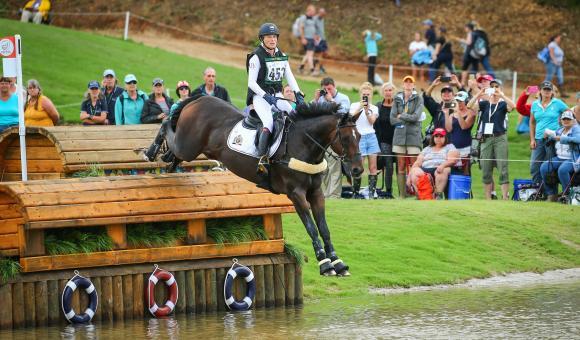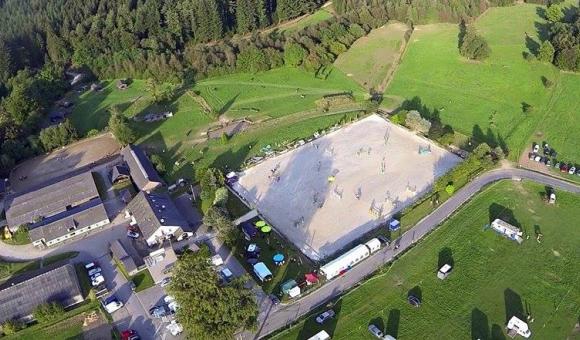
Free rein: Wallonia boosts its equine economy with new EquisFair business cluster
With the aim of exploiting the economic potential of the region’s horse industry, the EquisFair business cluster was launched at Liège Airport in February this year. While equine activities in the region are already renowned for their quality and quantity, the sector’s objective is to further elevate its image at home and abroad.
Wallonia’s business clusters are economic hubs that bring together companies, training centres and public or private research units with a common goal of partnership, joint projects and international visibility. EquisFair – the seventh business cluster the region – benefits from a three-year subsidy from the Walloon economy ministry.
The region has a long tradition of horse breeding, and the equine industry generates more than €1 billion a year. But it remains underexploited, according to one of the cluster’s founders, Jean-Philippe Lejeune, technical director of the European Horse Centre at Mont-le-Soie in Luxembourg province.
“A recent study by the centre for the Walloon agricultural ministry revealed its enormous potential,” he says. He believes the sector’s image needs updating because of its reputation as an elite activity. “Horses are part of many people’s lives, whether it be for pleasure or participation in international competition. Economic activities around horses are very diverse and they merit being showcased.”
Belgium’s speciality is the breeding of show-jumping horses, Lejeune says. “The country’s three studbooks are regularly featured in the top ten of world rankings. While there are a few larger stud farms, the average breeder in Wallonia owns two or three breeding mares, which produce the same number of foals each year,” he says. The cluster is an excellent opportunity to boost the sector and all its activities: “I believe it will improve its image, federate its businesses and facilitate their access to financial aid for research and export, as well as being a useful development tool at a local and international level.”
Since its launch, EquisFair has attracted considerable interest, with requests for information and membership from a variety of organisations. In addition to eight founding members, the 14 active members reflect the depth and diversity of the local equine industry (see below). A study by the European Horse Centre revealed the region’s enormous potential.
The cluster aims to make the sector in Wallonia more professional, increase marketing and assist research and development in new products. For opportunities abroad, it is focusing on three main areas: an export strategy for high-value products such as surgical and food supplements; an export strategy for standard and high-quality products that will increase collaboration between Wallonia and Flanders, France, the Netherlands, Germany and Luxembourg; and promoting the available space in Wallonia that could be of interest to foreign investors.
Other strategic priorities have been outlined, which include encouraging innovation, reinforcing commercial links and exploring new markets, sharing good practices, developing partnerships and working groups according to certain topics, and creating synergies with existing clusters and competitive poles in the region.
As part of the mission to promote the sector at home and abroad, an inventory of all actors is to be drawn up, and the cluster will identify the weaknesses and strengths of the sector in Wallonia and neighbouring regions and countries to help target and develop the international strategy.
The cluster is already publicising its activities by taking part in salons and fairs around the world, giving smaller businesses a chance to showcase themselves. Coming up on its agenda are stands or participation at: Libramont Agricultural Fair from 26 to 29 July, the equestrian branch and research laboratory of the Conférence Liège Créative on 16 October, the technology economic mission to Texas, US from 23 to 25 October, Jumping International de Liège from 29 October to 4 November, Fieracavalli International Horse Festival in Verona, Italy from 7 to 10 November, and an economic mission to China led by Princess Astrid from 16 to 22 November.
The European Horse Centre
The European Horse Centre in Luxembourg province was founded in 2000 to promote horse breeding in Wallonia. A non-profit organisation, it is one of eight founding companies behind the cluster, and acts as an interface between horse breeders, equine businesses and various administrative bodies. It works closely with the province, Liège University – in particular the veterinary medicine department - and the Equestrian League Wallonia Brussels.
An important part of its remit is to carry out research and other services for the agricultural ministry, annually evaluating and responding to problems raised by breeders in the region. Research includes examining orthopaedic pathologies linked to growth, which have a significant economic impact for breeders.
An additional branch of the centre’s activities consists of training, participating in equine promotional events powered by the Walloon region, and providing expertise to Walloon Ecuries, which supports horse-riding events and works to prevent pathologies relating to musculoskeletal disorders and lameness.
While the centre receives subsidies for these activities, it also offers private services, such as cross-country facilities for horses and riders and the organisation or partnership of competitions and equestrian events. It is also a EU-certified reproduction centre, handling the insemination of mares, embryo transfers and the production of frozen sperm from stallions according to strict sanitary and quality standards.
THE FOUNDERS
The European Horse Centre is a publicly and privately funded facility that represents and promotes the equine industry in Wallonia.
Delhez Bois/Cleanbox is the leading manufacturer of 100% natural, dust-free and biodegradable wood shavings for stable boxes.
EQScience offers a range of services for equine industry companies, ranging from science and healthcare to consulting, coaching, marketing and management support.
Moulin Georges sprl has been providing quality horse feed for 50 years and has recently developed complementary food.
Peter Müller DURAfence is a specialist supplier of custom-made wooden enclosures, sturdy fences and gates.
Progenus offers a full range of services to its partners for DNA research, from the development of a test to a complete research project.
Revatis is a Liège University spin-off developing a system of regenerative veterinary medicine.
Haras Sonnenhof is a stud farm that breeds, raises and trains horses. The family business is based in Saint Vith.
ACTIVE MEMBERS
Alcyon Belux supplies a complete range of products to veterinary centres.
BiopTis is active in equine health and performance, working with two Liège University research centres.
Cavalo Concept is an outdoor and sporting goods company that creates designs for riders.
Ekism provides apps for riders with identity data storage, an equipment and feed checklist, a training and care diary and financial project management.
Tagalo is an app that reinforces the safety of outside riders in case of accidents and falls.
Equideo provides video and livestreaming of horses and ponies.
Kevin Bacon’s is a family horse care business making laurel hoof dressing products.
SBS Studbook is a voluntary organisation that holds records for Belgian sporting horses, in particular showjumpers.
Trenker Labs is a pharmaceutical laboratory that produces and distributes medication and food supplements.
Roland Quoidbach is a safety coordinator specialising in equestrian projects.
Compositi makes accessories for horses and riders.
Liège Airport’s purpose-built Horse Inn provides overnight accommodation for more than 3,000 horses that transit the freight hub each year.
EEM World organises equestrian events and is the creator of the Masters Grand Slam brand as well as the Longines Masters.
SA Clarenne Travaux is specialised in the development of equestrian grounds.
IN FIGURES
€1.1m turnover of the equine sector in Wallonia
6,600 direct and indirect jobs
2,200 businesses
77,233 hectares of agricultural land (11% of total agricultural surface)
131,000 horses in Wallonia
By Sarah Crew
